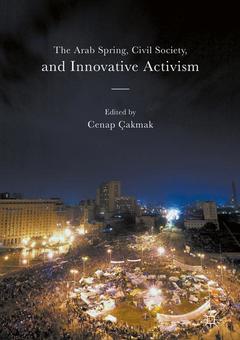The Arab Spring, Civil Society, and Innovative Activism, 1st ed. 2017
Coordonnateur : Çakmak Cenap

This book investigates the role of society groups in the making of the Arab Spring and under which conditions they attained their goals. Democracy and recognition of human rights and fundamental freedoms seem to be the main drives of the people organized in form of civil groups or grassroots movements in the Arab Spring countries; but it is essential to identify when they find it suitable to take such extreme action as taking the streets in an attempt to take down the repressive regimes. It is also important to investigate what methods they relied on in their action and how they challenged the state and the government. A review of the cases in this volume shows that civil society has certain limitations in its action. Analysis of the cases also challenges a commonly held assumption that the Arab world does not have strong and rich civil society tradition. However, for a lasting success and consolidation of democracy, something more than civil society action is obviously needed. A strong organized opposition and a democratic culture seems to be indispensable elements for the evolution of a democratic order and tradition.
1. Introduction
Cenap Çakmak
2. “Dogs of Wall Street, Let Us Alone”: Graffiti in Cold War Baghdad, 1953
Elizabeth Bishop
3. When Pundits Fail: “We Are All Khalid Said” and the Challenge of Democratizing Egypt
Nivien Saleh
4. Civil Society and Political Change in Contemporary Egypt
Ignacio Álvarez-Ossorio
5. Social Media and the Arab Spring in Bahrain: From Mobilization to Confrontation
Magdalena Karolak
6. The Middle Eastern Gender Gap: The State Of Female Political Participation Before, During and After the ‘Arab Spring’
Ryan C. Merrill
7. The Arab Spring through a Libyan Prism: Contagion, Cleavages and Adverse Transition
Jason Strakes
8. Re-imagining the ‘state’ in Syria during the first year of the uprising (2011-2012)
Lana Khattab
9. Rooted in History: The Politics of Middle Eastern and North African Soccer
James M. Dorsey
10. Civil State in the post Arab Spring Countries: Tunisia, Egypt and Libya
Ibrahim Natil
11. Conclusion
Cenap ÇakmakCenap Çakmak is Professor of International Law and Politics at Eskişehir Osmangazi University, Turkey, and Senior Researcher at Wise Men Center for Strategic Research, Turkey. He previously conducted research at the TMC Asser Institute, Netherlands, and the Max Planck Institute for Comparative Public Law and International Law, Germany, and is currently Visiting Scholar at the Raoul Wallenberg Institute, Sweden. His most recent publications include Post-Conflict Syrian State and Nation Building (2015), Islam: A Worldwide Encyclopedia (2016), and A Brief History of International Criminal Law (2016).
Examines the motivation behind the actions of civil groups during the Arab Spring
Highlights the methods used by civil groups to challenge the state and the government, using case studies to suggest the limits of civilian action
Challenges the view of strong civil tradition within the Arab world, suggests steps required for the lasting success of democracy
Date de parution : 12-2016
Ouvrage de 257 p.
14.8x21 cm
Disponible chez l'éditeur (délai d'approvisionnement : 15 jours).
Prix indicatif 126,59 €
Ajouter au panier


